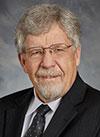Question
When I communicate with opposing counsel using email, I typically include my client as a recipient of the email. Is this a good practice?
Answer
I wrote about this topic in “Spare ‘Cc’ and ‘Bcc’ When Emailing Opposing Counsel,” 92 Wis. Law. 54 (Feb. 2019). In that piece, I recommended that lawyers not send a courtesy copy of any communication when the communication is sent to opposing counsel. I expressed concern about using the courtesy-copy (Cc) function or the blind-courtesy-copy (Bcc) function because of a potential risk of a communication going to another party if someone responds to the communication.
 Dean R. Dietrich, Marquette 1977, is the president-elect of the State Bar of Wisconsin. He is with the law firm of Weld Riley S.C., Wausau, and is past chair of the State Bar Professional Ethics Committee.
Dean R. Dietrich, Marquette 1977, is the president-elect of the State Bar of Wisconsin. He is with the law firm of Weld Riley S.C., Wausau, and is past chair of the State Bar Professional Ethics Committee.
A recent opinion from the American Bar Association’s Standing Committee on Professional Ethics and Special Responsibility suggests that lawyers must be extra cautious when sending to their own client a courtesy copy of a communication to the opposing party. In ABA Formal Opinion 503, the committee concluded that when the email (the communication to opposing counsel) indicates that the lawyer has sent the email to the client, the lawyer is consenting to the opposing counsel using the “reply to all” function and to the opposing counsel communicating directly with the client of the attorney sending the communication.
This opinion concludes that sending to a client a courtesy copy of a communication to opposing counsel (or opposing party) is a waiver of the requirements of SCR 20:4.2 that the opposing attorney must not communicate directly with the client of the attorney sending the communication. There has always been a question whether the showing of a courtesy copy to the client represents a waiver of the direct-communication prohibition, and the ABA Opinion suggests that this does constitute a waiver of the requirements of Wisconsin SCR 20:4.2.
Although I do not necessarily agree with this conclusion, I think that to avoid possible problems, the best practice for lawyers is to not send to their clients a courtesy copy of a communication to the opposing party or counsel. Instead, lawyers can send to themselves a copy of the communication and then forward that communication to their client. This creates an appropriate separation of the communications so that there is no basis for a claim that the lawyer has given permission to the opposing counsel to communicate directly with the lawyer’s client.
This might involve some changes in office practices. Preserving the confidentiality of communications with one’s clients and avoiding any argument that opposing counsel is now allowed to communicate directly with the clients are vital.
